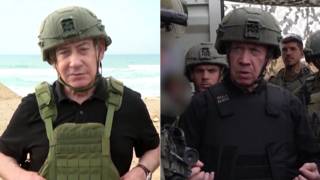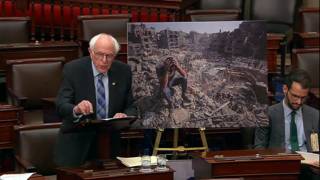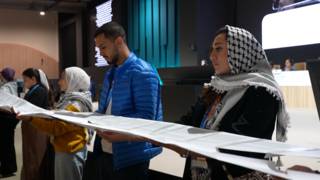
Related
Topics
A former U.S. soldier was arrested Monday on charges of raping an Iraqi woman and killing her and three family members. This comes as hundreds of people around the country begin fasts to protest the war in Iraq. We speak with an Iraq war vet who was arrested protesting war on July 4th and an Iraqi blogger–both are participating in the fast. [includes rush transcript]
On Monday, a former soldier was arrested on charges of raping an Iraqi woman and killing her and three family members. Prosecutors charge that four months ago Steven Green walked into a house in the town of Mahmudiyah, killed three family members, and that he and another soldier raped a woman named Abeer Qasim Hamza. The age of the rape victim is unclear though the mayor of Mahmudiyah said she was 15 years old. These latest charges come on the heels of a number of investigations into U.S.-led civilian atrocities in Iraq.
Meanwhile thousands of protestors gathered across the nation yesterday to protest the on-going war in Iraq. One of the largest demonstrations took place in Washington D.C and was organized by the anti-war group Code Pink. Code Pink also launched a nationwide fast to demand an end to the war. The fasters will stay in front of the White House every day until August 14th, when they move the hunger strike next to President Bush’s vacation ranch in Crawford, Texas.
- Raed Jarrar, an Iraqi blogger and architect. His blog is titled “Raed in the Middle”. He is also the Iraq Project director for Global Exchange. He is participating in the fast to end the war.
- Geoffrey Millard, an Iraq War veteran who served for 13 months. He was arrested on Tuesday during the antiwar protest in Washington D.C. He is participating in the fast to end the war.
Transcript
AMY GOODMAN: We’re joined by two of the fasters now. One is an Iraqi blogger named Raed Jarrar; and Geoffrey Millard, he is an Iraq war veteran who served for thirteen months in Iraq. He was arrested on July 4 during the protest in Washington, D.C. We welcome you both to Democracy Now!
GEOFFREY MILLARD: Thank you.
RAED JARRAR: Thank you.
AMY GOODMAN: Let’s begin with Raed Jarrar. You are an architect. You are well known as the blogger who runs the blog raedinthemiddle.blogspot.com. Your response to the news of this latest atrocity in Iraq?
RAED JARRAR: The latest atrocity is one of the crimes that are happening in Iraq, but this one is having a big national coverage now and it’s turning into an Iraqi national crisis because of the significance of it. Yesterday, the Iraqi parliament — one of the Iraqi parliament’s members, as the Iraqi parliament held an emergency session, and they called the prime minister, Mr. al-Maliki, from his trip to come back home and discuss the issue of the rape. And the member of parliament who asked for the session is an Iraqi woman, and she said that raping an Iraqi woman affects all of Iraq’s honor, and this is a national problem that should be dealt with very seriously. The Iraqi media and the Arab media are taking this case very seriously, and I think that because the girl, at Abeer al-Janabi, she belongs to a very big tribe, al-Janalbi tribe. It’s a tribe with both Sunni and Shia branches in Iraq, and this will have a very strong reaction from her tribe and from the local community all around the country.
AMY GOODMAN: Now, this case that took place in March in Mahmudiya, again, the soldiers — now only one has been charged at this point, Steven Green, and he was dismissed, the military says — is being somewhat vague about this, but saying because he suffered a personality disorder. But he was picked up in North Carolina, now is being charged in a federal court. The allegations are that they took the three family members — the father, the mother, seven-year-old sister — into one room, that Steven Green killed them, came out, said “I killed them,” and that he and another soldier then raped the young woman, then burned her body to destroy the evidence. What about the other soldiers involved with this? What news do you have of this, Raed Jarrar?
RAED JARRAR: I don’t have much news about them, but I know that the Iraqi government is asking for an Iraqi investigation for this, which is a very strong Iraqi request. It goes against the Bremer orders that give U.S. soldiers amnesty inside Iraq, and they can’t be prosecuted in Iraqi courts or they can’t be investigated by Iraqi police.
So one of the more interesting points, in fact, Amy, is that the family of the girl, the rest of her family, her uncles and other relatives, were informed by the Iraqi police officially that this crime was done by terrorists, and this is one of the reasons why they did not follow up on the crime, because they did not know who committed it. So this, in fact, indicates how many other crimes are being — are happening in Iraq, and they are being blamed on terrorists in the time that maybe other people are committing these crimes, and no one is following up to discover who did them.
AMY GOODMAN: I wanted to bring Geoffrey Millard into this conversation, who served 13 months in Iraq. The unit that Steven Green is a part of, apparently the same unit in which the most recently two U.S. soldiers were abducted and then their bodies found. Can you talk from your perspective as a U.S. soldier who has returned, your reaction to this story?
GEOFFREY MILLARD: Well, to be perfectly honest with you, Amy, it’s not very shocking to me. It surprises me that most Americans are very surprised by this, in that to the American G.I., they are taught from the day that they land in Kuwait and every moment that they move north into Iraq and every moment they’re in Iraq, they’re taught to dehumanize Iraqi people. This term ”haji” is very prevalent, and to the Muslim world, the term ”haji” is actually a term of endearment for those who have completed that pillar of Islam, who have made the Hajj to Mecca. But to the U.S. military, it’s a term of dehumanization, one that’s used so that the American G.I. can kill without question and who can follow an order to kill someone without question, whether it’s in a gunfight or any other situation. And so when you have this dehumanization factor, then it continuously will escalate. And to me, when we’re not investigating things like checkpoint killings, which happen every single day in Iraq, and this is just the logical outcome of that process escalating.
AMY GOODMAN: Were you involved with any of these checkpoint killings? You were where, based in Tikrit?
GEOFFREY MILLARD: I was based in Tikrit, and I worked for a general, so most of my time was spent actually going through secret material and putting together informational briefings for my general. There was a checkpoint killing one day that I was not directly involved in the shooting, but that evening I sat in a briefing, where that was briefed to a general, and a full bird colonel turned to an entire division staff and said — and I’ll abbreviate this, because we’re on the radio — but said in this checkpoint killing, an entire family was murdered — a mother, a father and two young children, a young boy, age of four, and a young girl, age of three, were all killed that day in a car. It was moving very quickly towards a traffic control point, at which time a private pressed the butterfly trigger of his 50-caliber machine gun and killed this whole family. And as this was briefed to the general, a full bird colonel turned around to the division staff and said — and I quote — “If this f**ing haji learned to drive, this s** wouldn’t happen.” And that really was a big turning point for me in realizing what war was truly about, and the fact that this term ”haji” isn’t just a term that grunts use on the ground, it’s one that is projected down from the top, all the way up in ranks downward upon the average G.I.
AMY GOODMAN: Who said this?
GEOFFREY MILLARD: That came from a colonel, and I don’t usually use his name publicly, but it came from a full bird colonel in front of a division-level staff in an evening briefing.
AMY GOODMAN: And the general who was there?
GEOFFREY MILLARD: The general that was there was the general who I worked for, which was Brigadier General Sullivan.
AMY GOODMAN: And did anyone object to what had happened?
GEOFFREY MILLARD: Not at all, not whatsoever. The whole room kind of nodded in agreement, and the briefing went on. I was really shocked by it. It made a huge impression onto the way that I viewed warfare in general. Before I went to this war, I believed, like many soldiers, in a just war concept and that you could have a just war, and my experiences in Iraq have made me turn against all war in all forms.
AMY GOODMAN: And so, you’ve come back. You are now on the fast that began this Independence Day weekend, sponsored by Code Pink, that many people are joining, Troops Home Fast. You were arrested yesterday, Geoffrey?
GEOFFREY MILLARD: Yes. I’m a member of Iraq Veterans Against the War, a very large national and now actually international organization of Iraq war veterans and those who have refused to serve in Iraq and some Afghanistan veterans, as well. And we went to protest there with Code Pink, and I noticed that there are a lot of veterans’ organizations who were represented in the parade, but there were no veterans’ organizations who were antiwar, though there are a lot of us in existence — Veterans for Peace, Iraq Veterans Against the War, Vietnam Veterans Against the War. So there’s a number of antiwar veterans’ organizations, but we were not permitted to be in the parade, and I thought that to be unfair, so I attempted to walk in the parade as a veteran, and I was picked up and placed on the sidewalk the first time. The second time, I was taken to jail.
AMY GOODMAN: Raed Jarrar, Iraqi blogger, architect living now here in this country, what is your response to U.S. soldiers like Geoffrey Millard, who come home and then speak out against war?
RAED JARRAR: I have a number of personal relationships with U.S. soldiers, even when I was in Iraq, and I don’t really see U.S. soldiers as the enemy or a part of the game that we should be fighting against. Most of the U.S. soldiers are victims. They are as victims as Iraqis. So, I mean, I’m always ready to work and support their work. And Geoff is, and the rest of the Iraq Veterans Against the War are, doing very great job in letting the U.S. public know what exactly is happening in Iraq.
AMY GOODMAN: Well, Raed Jarrar and Geoffrey Millard, I want to thank you very much for being with us. We will continue to cover Troops Home Fast, the fast that’s taking place all over the country to bring the troops home and to end the war.












Media Options